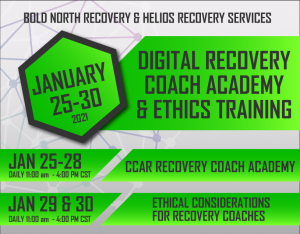Hello and Happy Holidays. I am grateful to share this blog again with a leader in the Recovery Coach movement. Jim Wuelfing has been an instrumental force in the development of the Recovery Coach Academy and other trainings that incorporate the values of multiple pathways and meeting people where they are at. Jim was recently on the Recovery Coach Connection, where he shared his recovery story and background about the training. My hope is that this blog will serve as an invitation for us to become more open to pathways that include Harm Reduction.
 Lastly, in the spirit of the season, I wanted to offer an opportunity for In the Rooms members to participate in the January 25-30 Recovery Coach Academy & Ethical Considerations. If you register and mention you learned about the training via this blog, you will get a $50 discount. You can learn more about the training and send an email to register at: www.heliosrecovery.com. These two training pieces can help move you toward becoming a CCAR Recovery Coach Professional, or a state certification where it’s recognized.
Lastly, in the spirit of the season, I wanted to offer an opportunity for In the Rooms members to participate in the January 25-30 Recovery Coach Academy & Ethical Considerations. If you register and mention you learned about the training via this blog, you will get a $50 discount. You can learn more about the training and send an email to register at: www.heliosrecovery.com. These two training pieces can help move you toward becoming a CCAR Recovery Coach Professional, or a state certification where it’s recognized.
AA Isn’t for Everybody
People have known and celebrated the value of peer-to-peer service for centuries. The reciprocal nature of such a relationship rests on the value of shared experiences. These can be both difficult and devastating experiences, as well as positive life-changing experiences. In the arena of addiction recovery, peer-to-peer service became the bedrock of the 12-step movement.
In 1935, Bill Wilson and Dr. Bob Smith founded Alcoholics Anonymous, an abstinence-based model with 12 suggested steps of recovery. The abstinence model has been the dominate model of recovery treatment in the United States ever since. But let us not forget: the founders of AA fully realized that the AA Program is not for everybody. In 1965, on the 30th anniversary of the founding of AA, Bill Wilson spoke at the International Conference of AA. He stated that over the past 30 years, over one million people crossed the threshold into AA. He then asked the audience, “What are we doing for the six hundred thousand that did not stay?”
Supporting all Pathways to Recovery
Before I go any further, and risk the chance of coming across as a non-supporter on an abstinence-based and/or a 12-step program, let me introduce myself. My name is Jim and I am in long-term recovery, using an abstinence-based pathway incorporating a 12-step way of living. I have been doing so for 36+ years. I also fully support the idea that there are many pathways to recovery. As a provider and supporter of peer-based services, I need to know about them and work to be fully supportive. It’s the “fully supportive” piece that can still be a challenge for me at times.
Most of the recovery support movement has as founding principles that you are in recovery when you say you are, and that we will support all pathways to recovery. Twelve years ago, when I first started training recovery coaches, I would get a fair amount of resistance to that statement. Presently, that’s not the case. What concerns me is not people’s acceptance of multiple pathways, but rather, their ability to fully support a pathway they know little about.
Meeting People Where They Are At
All of the pathways of recovery deserve full support and open discussion. To discuss all the pathways is not within the scope of a short piece such as this. But I would like to briefly address harm reduction, as well as meeting people where they are at in their own discovery process. I believe meeting people where they are at, no matter where they are at, requires open-mindedness and curiosity. It involves asking good questions, actively listening, being open to outcomes without being attached to them, and constantly checking for and controlling my own biases. These efforts are not ‘one and done’, but rather an ongoing process for me.
Harm Reduction
In my efforts to help and train other peer assisted recovery providers, harm reduction seems to be one of the most misunderstood pathways. Harm Reduction, as defined by the Harm Reduction Coalition, is “a set of practical strategies and ideas aimed at reducing the negative consequences associated with drug use.” Furthermore, the Harm Reduction Coalition states that Harm Reduction is also “a movement for social justice, built on a belief in, and respect for, the rights of people who use drugs.”
Most of the time, the people I am working with primarily see harm reduction as pharmacological intervention in opioid use disorder treatment (medicated assisted treatment and/or medicated assisted recovery). That’s a very narrow view, and thereby inaccurate perception of harm reduction. I would ask all peer assisted recovery providers to ask themselves if they can truly support a pathway that is guided by a definition provided by John Szyler, co-founder of the Chicago Recovery Alliance, when he states, “Harm reduction is any positive change as a person defines it for him/herself.”
Working to be Fully Supportive
My recovery experience has, and continues to be, an abstinence-based effort. So, to be fully supportive of an individual whose recovery process may not be abstinence based, I need to make an ongoing effort to educate myself about all of the nuances involved. I cannot do this on my own, or by reading and/or taking a few classes.
To be fully supportive, I need to learn from those who practice this model, in spite of all the hurdles they meet from others in the recovery community. I need to realize my biases and paradigms run so deep that I may not even be aware of them. When someone challenges my helpfulness, I need to remain open and receptive. I’m not saying that if you are reading this, you are like me. I’m only asking that you be willing to explore how to be better at what you do for recovery supports.
About Jim
Jim Wuelfing is owner and principle associate of the New England Center, dedicated to exceptional training, facilitation and consulting services for nearly 40 years. In the recovery supports arena, he has been a major contributor in the design and delivery of several curricula. These include the CCAR Recovery Coach Academy and CCAR Ethical Considerations for Recovery Coaches, as well as SOS Developing Excellence in Recovery Coaching and Recovery Coaching a Harm Reduction Pathway. He has aided in the formation of several statewide recovery community organizations. Jim has served on the board of the Massachusetts Organization of Addiction Recovery. He also has a decades-long experience working on social justice issues, focusing on racial inequities and understanding the dynamics of power and privilege. He co-wrote with Arthur Woodard, Jr. the nationally well-received training Racism of the Well-Intended.






